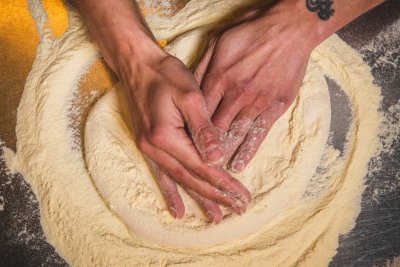Sustain / Real Bread Campaign / Articles
In sourdough we crust
Dan and Duncan Edwards, owners of Four Hundred Rabbits in London, share their sourdough pizza passion.

When we were doing our research before opening our first branch of Four Hundred Rabbits, we visited pretty much every pizza place of note in London. We found that an overwhelming amount of them were using fast-rise, white doughs, made with dried yeast. These were proved for between four and twenty hours, with varying results. We were also finding that we could rarely finish the pizza in front of us and were left with an unpleasant, bloated feeling after eating. While all pizzas are generally delicious when they are served directly from a piping hot oven, there is more to the experience than that initial bite.
Sourdough fits with our ethos and the Slow Food movement, which I suppose is a paradox when thinking about pizza, which traditionally is a fast food. Good things take time and effort. Our dough is genuine sourdough, with no added yeast. We prove it for a minimum of 48 hours, though we often use a very slow dough that has been proving for 75 hours or more. Over this time, the lactic acid bacteria modifies the gluten, which results in a pizza base that some people find is more digestible. It also has a great depth of flavour – as something like 80% of the finished pizza is the base, it needs to be the absolute best thing it can be!
Base lines
We prepare all of our dough centrally to ensure that customers get the same level of quality in each of our restaurants. We learnt that pretty much every pizza oven we have across our restaurants behaves completely differently. Each has different hot spots and different heat, depending on whether it is fired by wood or gas. Every pizza chef has slightly different cooking techniques, too. Given all those variables, we needed to create a dough that would behave the same. It took a fair amount of time, effort, and playing around with hydration levels to get it just right.
Our primary ingredient is a strong, fine Canadian flour, milled in the Cotswolds, to which we add Spanish extra virgin olive oil, double-ground semolina flour and sea salt. The hydration rate is lower than, say, a Neapolitan pizza dough, which typically will be around 56-63%. Neapolitan doughs are designed to be cooked at extreme temperatures very fast - usually for only around 60 to 90 seconds. Our pizzas require longer in the oven, so we are at around 50% hydration. The result is a slight crisp shell to the outside, which gives way to a fluffy interior.
A slice of sourfaux?
A few years ago, it did feel like the word sourdough was being used left, right, and centre by pizza restaurants in London. There were lots of stories around about knowing that the arrival of a sourdough pizza place was a sure sign that the area you live in was becoming gentrified, but this doesn't seem to be the case these days.
We do wonder if using genuine sourdough is a little too much work for most pizza places - it really is a labour of love. We’re not going to name any names, but we have chefs working for us who have come from several London pizzerias with sourdough in their names. Our pizzaioli have told us that dubious practices are commonplace. The main example we heard about is using a small lump of a previous batch of dough and adding some fast-acting, dried yeast into the new batch of dough being prepared for that day. Fine, but it’s not genuine sourdough.
I guess compromises must be made as places grow. We’re not sure how commonplace this is but as there is no legislation around what can and can’t be called sourdough, businesses can do what they like and customers are none the wiser. There are of course other places that are doing it right - Sodo Pizza is great, for example.
Sourdough pizza spotter’s guide
We believe that the key identifier to knowing what is and isn’t sourdough is flavour. You can instantly tell if your pizza does or doesn’t have that tell-tale sour tang to it. We are probably a little more attuned to it due to the amount of pizza we eat here! We think you can tell by the colour as well, as it needs to cook for longer due to its proving rate, so tends to be darker. Finally, sourdough tends to be a little denser, and heavier than dough made using baker’s yeast.*
If you want to be cheeky and check if it’s genuine sourdough, try and see what temperature they are firing the oven to, if it is up around the 500°C's we think it’s unlikely to be a true sourdough pizza as it just doesn't react well to those temperatures.
If you’re wondering about the name, we took our inspiration from the centzon tōtōchtin (400 rabbits) of Aztec mythology, who were fond of mischief, drinking and partying. That sounded like fun and as the legend of their parents (Mayahuel and Patecatl) is tied in with fermentation, one of our favourite subjects, it seemed like a good fit.
*As the Real Bread Campaign always says, however, sourdough isn’t a look, taste or style – it’s a process. Sourdough bread (including pizza bases) can be made with little to no noticeable tang, and can be light and airy, for example. [ed.]
Published Thursday 9 February 2023
Real Bread Campaign: The Real Bread Campaign finds and shares ways to make bread better for us, better for our communities and better for the planet. Whether your interest is local food, community-focussed small enterprises, honest labelling, therapeutic baking, or simply tasty toast, everyone is invited to become a Campaign supporter.

